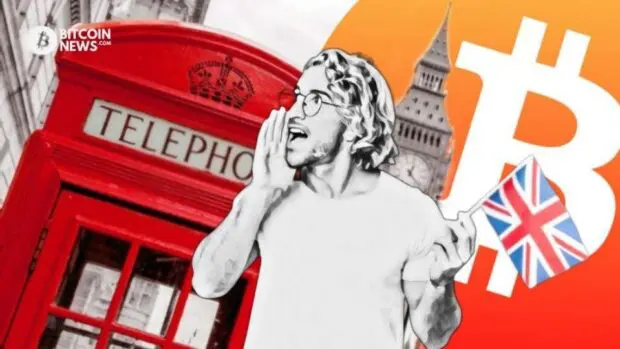The U.K. government has been making steady progress in its research and development of its very own central bank digital currency (CBDC). Growing public opposition to this development could instead accelerate the mainstream adoption of decentralized money, most notably bitcoin.
Britcoin, The Bank Of Englands Last Hope?
Unofficially dubbed “Britcoin,” the British CBDC could be implemented to exist alongside fiat pounds in an economy that still retains cash.
However, some fear that CBDCs are a gateway to totalitarian monetary policies and authoritarian government rule, as well as a pathway towards a cashless society, which introduces problems of its own.
At a ‘Truth Be Told’ march in London to raise awareness of the effects of the Covid vaccines, Michael Yeadon, PhD, spoke about his fears of CBDCs.
Potential problems with CBDCs
The arguments against CBDCs are primarily about privacy and centralized power. With a digital currency issued by the central bank, the government essentially has complete control over how that money can be used.
Some fear that a kind of social credit score could be introduced, meaning those who don’t behave as the government would like them to could see their purchases blocked. For example, the government could implement a carbon allowance that would block your fuel purchases if you’ve already gone over your ration.
The U.K. government has assured its citizens that there are “no plans to program CBDC or restrict how money is spent,” but the nature of CBDCs would allow any future governments to backtrack on those promises.
Likewise, the government has stated that there are no plans for CBDCs to replace fiat currency or cash, yet this is considered highly likely by some who have noticed the global usage of cash drop in recent years.
Currently, 100 countries are at some stage in developing CBDCs, illustrating a global trend towards digital currency adoption.

The government’s assurances that it would not program or control the digital currency seem slightly suspicious, considering they have announced a possible limit of £20,000 for each citizen.
This may suggest that they are indeed not planning to replace cash, and instead are looking to implement the CBDC alongside fiat, rather than replacing it entirely. However, it does not ease concerns that the government will have direct control over limiting the use of the currency.
There is even some concern from within the British government, with the House of Lords Economic Affairs Committee concluding that “the idea [of a CBDC] was a solution in search of a problem.”
Could CBDCs be good for Bitcoin?
One potential upside of the increased development and potential implementation of CBDCs is that they will increase the public’s familiarity with digital currencies.
Citizens wishing to avoid the potential privacy and autonomy risks associated with CBDCs will have nowhere else to turn if society does end up going cashless. The choices will be government-issued, centralized digital currencies, or decentralized, peer-to-peer networks such as Bitcoin.
Bitcoin has been touted as a possible savior for the global economic system, with even Sean Lennon, John Lennon’s son, suggesting that only bitcoin can save us from the collapse of the U.S. dollar.
With fiat currencies slowly going the way of the Dodo, it’s likely that people will have to choose between CBDCs and decentralized private currencies.
With bitcoin having a number of benefits — such as being a store of value and hedge against inflation, a cheap and efficient option for remittances, and even being (contrary to popular belief) a potential savior for the climate — it stands to be a very popular alternative to central bank digital currencies.










